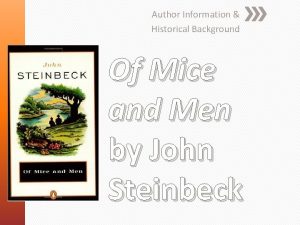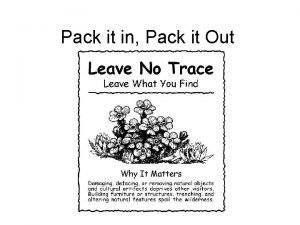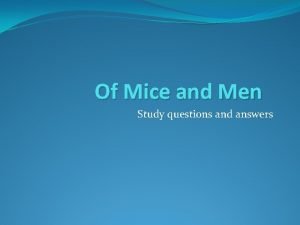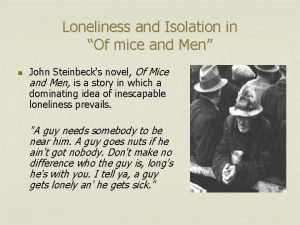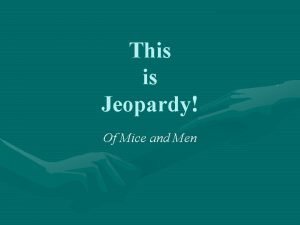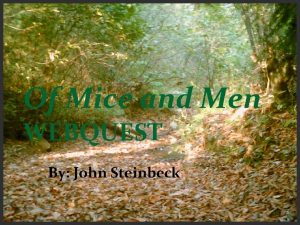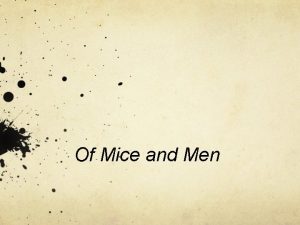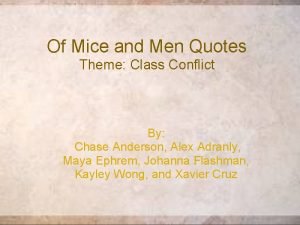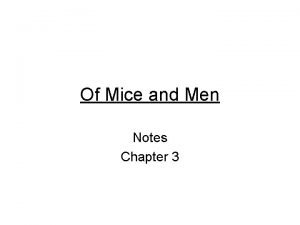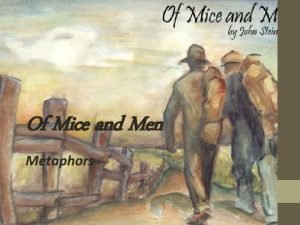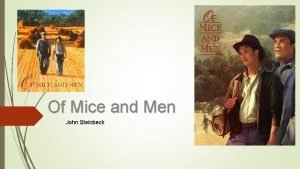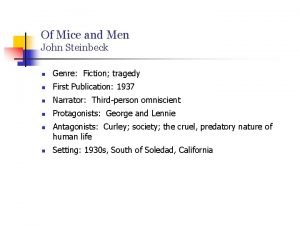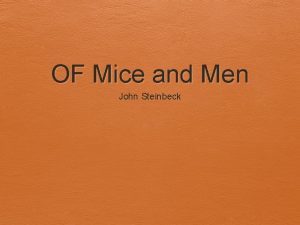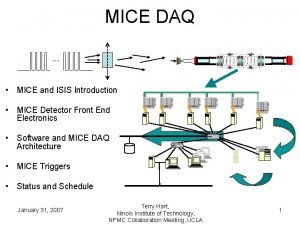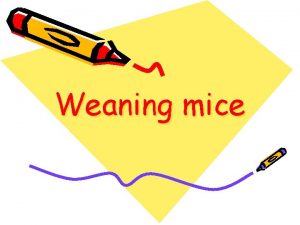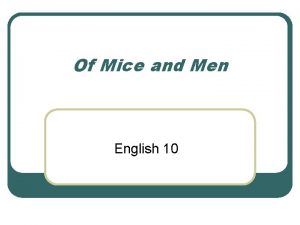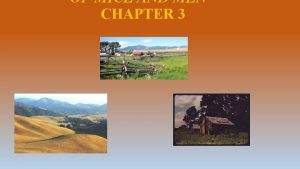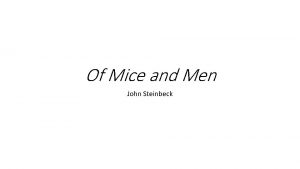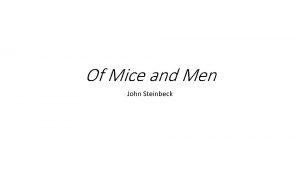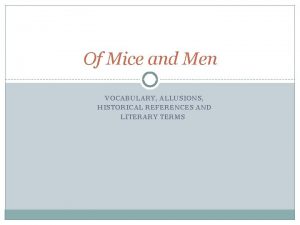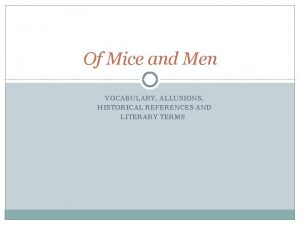Of Mice and Men Resource Pack Contents Historical












- Slides: 12

Of Mice and Men Resource Pack Contents Historical Context Synopsis Characterisation Section summaries, key scenes and analysis Themes, motifs, metaphors The writer’s choices Social and cultural impact on the reader Key terms Example answers Exam question technique

John Steinbeck • • • Born in Salinas, California in 1902. Grew up in fertile agricultural valley 25 miles from the Pacific Coast. Much of his fiction is influenced by these lands and his experiences growing up. Studied at Stanford University in 1919 (literature and writing) - left in 1925 without a degree. Became labourer and journalist in New York City – lasted for 5 years. His first novel was Cup of Gold (1929). Got married and moved to Pacific Grove – published two Californian based novels – The Pastures of Heaven (1932) and To a God Unknown (1933) – short stories The Long Valley (1938). Popular success and financial security arrived with Tortilla Flat (1935) and In Dubious Battle (1936), the latter focusing on the Californian labouring class. The renowned Of Mice and Men (1937) is the middle book in trilogy including In Dubious Battle and The Grapes of Wrath. He also became a filmmaker, a serious student of marine biology and devoted his services to war writing in 1940 s – he continued to experiment throughout – East of Eden (1952) his most ambitious – a saga of the Salinas Valley and his own family’s history. The last decades of his life were spent in NYC and Sag Harbor with his third wife – with whom he travelled widely. Steinbeck won a Novel Prize in 1962 and continued to write until his death in 1978. Celebrated friendship: in life and fiction. Interested in the outcasts, misfits, marginalised, oppressed. Base theme of Of Mice and Men is “understanding each other”. Steinbeck had an empathy for common people – their loneliness, joy, anger, strength, connection to places, craving for land. Critics sometimes argue that Steinbeck is sentimental – his novels divided audiences. Steinbeck’s best fiction has a tight, objective style – sustained by author’s awareness of genuine loneliness and tragedy of dispossessed Americans. Original title = Something That Happened. Concepts: “the way things are”, clinging to the margins of an unforgiving world, commitment, loneliness, hope, loss, dreams, friendship. Political purpose – response to problems of farm labour in California – itinerant labourer demand to harvest seasonal crops – tensions between underpaid agricultural labourers and the state’s agribusiness. West was considered the Promised Land – California seen as the Golden State. 350, 00 Dust Bowl exiles from Oklahoma, Arkansas and Texas came to California in the 1930 s – many became refugees – homeless, hungry, poor and proud. Steinbeck may refer to culture of the time but tell a fictional story around it – more inviting to the cause than a documentary style approach – deliberately dehistoricizes the novel. Of Mice and Men detaches the story from the labor unrest of the 1930 s – instead, homeless men roam round the state looking for work – low wages, squalid living quarters and no opportunities for advancement – farmers were powerless.

The US Great Depression Historical Context October 29, 1929 Wall Street Crash – stock market failure. Decade economic recession and decline – Pre WWII. 1930 -39 – widespread unemployment in US rose to 25%. Farming crop prices fell by 60% - agriculture industry suffered. Of Mice and Men is set in 1937 Soledad, California. The American Dream Thomas Jefferson stated in the United States Declaration of Independence draft on July 4 th, 1776: “We hold these truths to be self-evident, that all men are created equal, that they are endowed by their Creator with certain unalienable Rights, that among these are Life, Liberty and the pursuit of Happiness. ” James Truslow Adams (1931) defined the American by saying, “life should be better and richer and fuller for everyone, with opportunity for each according to ability or achievement” regardless of social class of circumstances of birth. Concepts including ‘The American Dream’ and ‘The Pursuit of Happiness’ were adopted as a national ethos promoting the opportunity of prosperity, success and upward social mobility through hard work. The historical rigidity of feudal systems, class structures and hierarchies were challenged by a dynamic, interchangeable system where the merit of working performance was a litmus test for someone’s social, professional and cultural position. The American Dream has since evolved to promote equality for every age, gender, race, culture, lifestyle and belief as well as class. Application to ‘Of Mice and Men’ George and Lennie have a dream of owning their own land where Lennie could tend rabbits and George could start his own business – this dream helps them deal with the harsh everyday reality of ranch work, strict employers and all kinds of social trouble. California ‘The Golden State’ is seen by George and Lennie as the ‘land of opportunity’ in pursuit of the American Dream – their migration is a typical example of how workers responded to the Great Depression and effects of the 1930’s Dust Bowl conditions. Consider: How has The American Dream affected the choices of George and Lennie as well as those they meet on the ranch in Soledad, California? Dust Bowl Dirty Thirties – severe dust storms damaging American agriculture. Severe drought and inability to apply farming methods caused wind erosion to be damaging. Drought and erosion affected 100 million acres (mainly in Texas and Oklahoma, but also Colorado, New Mexico and Kansas. Many thousands of families abandoned their farms becoming itinerant workers by migrating to California to find agricultural work. Application to ‘Of Mice and Men’ George and Lennie struggle to find employment during the era of the Great Depression – the agriculture industry have suffered because of the Dust Bowl and the effects of the 1929 Wall Street Crash – like many workers from Texas, Oklahoma and Colorado, they have chosen to migrate to find work. Consider: How have the historical conditions of labourers informed John Steinbeck’s fictional retelling in novel/play form? Key words and terms to apply context to essay writing: Itinerant labourers – manual workers that travel from place to place Migrant workers – similar meaning – travelling from other states/countries. Agriculture – farming industry. Wall Street Crash – when the worth of stocks on the stock markets plummeted and the balance of the economy was crushed – led to rising unemployment, soaring interest rates and general international instability. Erosion – the damaging natural wear and tear of landscapes.

Scene descriptions Section One Introduction of the location – Soledad and the Salinas River in California 1937 during the Great Depression Exposition of the landscape – warm water, yellow sands, “strong and rocky Gabilan mountains”, trees, lizards, rabbits, dogs on ranches, deer tracks, “path beaten hard”, swimming in pools, “tramps who come wearily down the highway” Introduction to extended metaphor – “stilted heron” Introduction of main characters Lennie and George – with character description – “dressed in denim” George = “small and quick, dark of face, with restless eyes and sharp, strong features…defined” Lennie = “a huge man, shapeless of face, with large, pale eyes, with wide, sloping shoulders…walked heavily, dragging his feet a little, the way a bear drags his paws. His arms did not swing at his sides, but hung loosely”, “drank with long gulps, snorting into water like a horse”, “big paw in the water” “Lennie. You gonna be sick like you was last night. ” – clue to backstory. “Imitated George exactly” – reveals simple-minded nature and his admiration for George – like a son or younger brother would – George is a middle aged man with learning difficulties “Bastard bus driver” – George is highly derogatory towards behaviour he finds unacceptable – bus driver not going whole agreed distance. Scowling at Lennie calling him a “crazy bastard” – context: angry after Lennie’s misdemeanours in Weed cost them their job – even more frustrated that Lennie can’t remember what they’re doing. “So we don’t get in no trouble” – wants to make sure Lennie doesn’t naively mess up again and cause them grief in their new job – still unaware what he did in Weed. Lennie has a mouse in his pocket he keeps petting – George reacts because the mouse is dead – wants to protect Lennie from diseases and throws dead mouse away. “You jus’ don’t there and don’t say nothing” – George thinks that if he does all the talking, Lennie won’t get them both in trouble – Lennie means to be obedient to George. “They run us out of Weed” – backstory revealed – run out of old job because Lennie naively upset a woman who thought he was intending to rape her. A water snake slipped along the pool, its head held up like a little periscope – relevance to the story’s extended metaphor. Section One (continued…) “George stood up and threw the mouse as far as he could into the darkening brush – Lennie’s whimpering cry” – tough love from George and reference to darkness. “A half darkness came in among the willows and sycamores” – second reference. “You get in trouble…I got to get you out” – tired of looking after Lennie. “Jus’ wanted to feel that girl’s dress - jus’ wanted to pet it like it was a mouse – Well, how the hell did she know you jus’ wanted to feel her dress? ” – George on Lennie. “His anger left him suddenly…looked across the fire at Lennie’s anguished face, and then he looked ashamedly at the flames” – dilemma: how to deal with Lennie’s troubles without upsetting him. “George, you want I should go away and leave you alone? ” – Lennie plays a guilt trip on Lennie aware that George realises he shouldn’t be too hard on him – aware that George won’t leave him – their friendship is more important. “First chance I get, I’ll give you a pup” – incentivising Lennie. “They ain’t got nothing to look ahead to” – George aware of the hopelessness of other ranch workers and the distance of the American Dream. “If them other guys gets in jail they can rot for all anybody gives a damn. But not us. ” – foreshadowing events. “An’ live off the fatta the lan’” – Lennie’s iconic dialogue. “if you…get in trouble…I want you to come right here an’ hide in the brush” – giving Lennie a get-out option out of care and protection. “If you do, I won’t let you tend the rabbits” – incentivising Lennie again –tough love. Section Two Introduction to the bunkhouse – “long, rectangular building – floor unpainted – apple box shelves… loaded with little articles” – simple, rough living quarters. “Boss was expectin’ you last night…he was sore as hell” – clear that work situation is tough. Old swamper Candy introduces himself. “The stable buck’s a nigger” – Candy in reference to Crooks – first example of racism in a Northern US state in 1930 s – not just a Deep South issue. Fight between Smitty and Crooks (referred to as Whitey by Candy) – “Crooks can’t use his feet” after racist attack. “Bus driver give us a bum steer” – George explained to Boss who is frustrated – “I had to send out grain teams short two buckers. ”

Section Two (continued…) Introduction to Curley’s wife – “full, rouged lips and Scene descriptions (continued…) Section Two (continued…) “He ain’t much of a talker is he? ” George Milton does all the talking, Lennie Small stays quiet (on George’s instruction). “Strong as a bull…good skinner…can rassel grain bags, drive a cultivator” – George loyally compliments Lennie – uses ranch terms to win favour. “He’s my…cousin” – lies to cover suspicion about his stake with Lennie. Boss: “I got my eye on you. Why’d you quit in Weed? . . . I seen wise guys before. ” – instantly suspicious. “Leave your big flapper shut” – “I forgot” -“If I was a relative of yours I’d shoot myself” “That’s a hell of an old dog” – George to Candy – Candy stands up for his dog – possible parallel with George standing up for Lennie even when others don’t see the point. Curley introduction – “a thin young man with a brown face, with brown eyes and a head of tightly curled hair…work glove on his left hand” – looks at Lennie – “his glance was at once calculating and pugnacious” “Let the big guy talk” – Curley immediately causing a conflict. “That’s the boss’s son…Curley’s pretty handy” – Candy praising Curley’s strength. “Curley’s like a lot of little guys. He hates big guys… Kind of like he’s mad at ‘em because he ain’t a big guy. ” – jealous of other men’s strength – wants to assert authority physically as well as occupationally. “this Curley punk is gonna get hurt if he messes around with Lennie” – George aware of Lennie’s strength and trying to scare Curley off because he knows what Lennie is capable of. “Glove’s fulla vaseline” – gossip from Candy about Curley’s left hand glove to keep smooth for his wife – perverse connotations. “I seen her give Slim the eye. Curley never seen it. An’ I seen her give Carlson the eye. ” – “Well, I think Curley’s married…a tart. ” – misogynistic attitudes towards Curley’s wife teasing and flirting. “He stepped out the door into the brilliant sunshine” – reference to the Utopian landscape and weather of California – reminder of the Sunshine State being of central importance to the American Dream. “ I don’t want no trouble” – Lennie’s repetition – avoids conflict if he can. “You keep away from Curley, Lennie. ” – clear reminder from George to Lennie. “If I get in any trouble, you ain’t gonna let me tend the rabbits. ” – incentivised. wide-spaced eyes, heavily made up. Her fingernails were red. Her hair hung in little rolled clusters, like sausages. She wore a cotton house dress and red mules, on the insteps of which were little bouquets of red ostrich feathers. ” - she values her appearance and has an extroverted approach to representation. “She puts her hands behind her back and leaned against the door frame so that her body was thrown forward” – one interpretation is that her choice of posture is intentionally suggestive. George is short and abrupt while Lennie continues to admire her – “She’s purdy” he says. “Don’t you even take a look at that bitch…jail bait” – misogynistic tone from George towards Lennie but in the attempt to protect him from trouble. “Glove fulla vaseline” – George repeats. “Le’s go, George. Le’s get outta here. It’s mean here. ” – Lennie becomes uncomfortable. Introduction to Slim – “jerkline skinner…prince of the ranch…tall man…gravity in his manner…ageless… thirty-five or fifty…slow speech…understanding beyond thought…undemanding” – favourable description for a ranch worker. “That big bastard there can put up more grain alone than most pairs can. ” – George compliments Lennie in an insulting way in order to impress Slim and establish himself. Brief introduction of Carlson – additional worker – secondary role. Slim – “You guys better come on while they’s still something to eat. ” – suggests that they are in a poor living situation and must make the most of every meal. Curley storms in again in search of Curley’s wife – George acts sternly. “I’m scared I’m gonna tangle with that bastard myself. I hate his guts. ” – George already taking a disliking to Curley. “Ancient dog walked lamely in through the open door. He gazed about with mild, half-blind eyes. ” – tragically frail. Section Three Dusk at the bunkhouse: workers playing card games – “table brilliant with light” – theme of light – positive camaraderie developing at this point Lennie wants to play with the puppies in the barn. Slim compliments Lennie’s strength and hard work even though he thinks he isn’t bright – “he sure can take orders”.

Section Four (continued…) Scene descriptions (continued…) Section Three (continued…) George criticises and compliments Lennie: “Slim neither encouraged nor discouraged him. He just sat back quiet and receptive” – easygoing worker very welcoming and level headed – “calm, Godlike eyes fastened on him”. “he never lifted a finger against me” – praises Lennie’s loyalty. Slim discusses paradox – nice guys aren’t smart and smart guys aren’t nice. George tells Slim disastrous story in Weed – Lennie’s actions misconstrued as potential rape – Lennie just likes to touch things – doesn’t know how to react when people scream – “The guys in Weed start a party out to lynch Lennie. ” “I didn’t mean no harm, George” – Lennie brings pup in and gets told off. Candy requests whisky. Carlson gets angry at the smell of Candy’s dog – “If you was to take him out and shoot him right in the back of the head” – foreshadowing event. “Candy looked helplessly at him, for Slim’s opinion were the law” – Slim gained the reputation for being the fair voice of reason. “It was quite dark outside now” – the ominous nature of death reflected in light/dark story motif – Candy’s dog about to be shot – “[Slim] led the dog out into the darkness” – “out of his misery”. “A shot sounded in the distance…[Candy] rolled slowly over and faced the wall and lay silent”. Whit discussed Curley’s wife: “She ain’t concealin’ nothing. I never seen nobody like her. She got the eye goin’ all the time on everybody. ” – mocking gossip. “Curley’s pants is just crawlin’ with ants” – Curley doesn’t trust her – “Where the hell’s Slim? ” – later, Slim scowls at Curley’s false accusations. George’s sexist opinion on men dealing with lust: “You give me a good whore house every time…a guy can go in an’ get drunk and get ever’thing outta his system all at once, an’ no messes”. Lennie mentions “the fatta the lan’” again dreaming of a world with rabbits. George lost in his own American dream – telling all of his ambitions. Candy wants in on the action – to find land somewhere. Carlson verbally scolds Curley – “You God damn punk…you’re yella as a frog belly…you come for me, an’ I’ll kick your God damn head off. ” – Curley decides to take out his humiliation on Lennie as a result – tipping point is when Candy murmurs “Glove fulla vaseline” as a nasty jibe – Curley calls Lennie a “big bastard” and “son-of-a-bitch” for laughing along with the guys and starts punching him – Lennie gives a “cry of terror” and doesn’t fend for himself until George gives him permission to fight back saying “Get him, Lennie. Don’t let him do it. ” - “Curley’s fist was swinging when Lennie reached for it. The next minute Curley was flopping like a fish on a line, and his closed fist was lost in Lennie’s big hand. ” – Lennie’s strength was scarily superhuman. Lennie - “I didn’t wanta hurt him” – Slim…[then] regarded Lennie with horror. “It ain’t your fault…this punk sure had it comin’ to him. But – Jesus! He ain’t hardly got no han’ left” – George shocked by Lennie’s unassuming brutality. Slim blackmails (strikes a clever deal) with Curley so that he won’t get Lennie and George fired – if he tells, everyone finds out he was beaten in a fight. Lennie repeats “I didn’t want no trouble. ” Section Four Description of Crooks’ living quarters – “negro stable buck…little bench for leather-working tools…could leave his things about…being a stable buck and a cripple…accumulated more possessions than he could carry on his back. ” “Battered magazines and a few dirty books on a special shelf over his bunk” – lifestyle of ranch workers in the bunk house could be perceived as misogynistic/sexist. Crooks was a proud, aloof man – kept his distance and demanded that other people keep theirs. Crooks defensive when Lennie tries to come into his room – “Nobody got any right in here but me” – “I ain’t doing nothing” Lennie explains – Crooks explains “I can’t play because I’m black. They say I stink. Well, I tell you, you all of you stink to me” – Crooks is very defensive because of the racist treatment he gets. Lennie is being friendly to him – “Crooks scowled, but Lennie’s disarming smile defeated him. ” Crooks goads Lennie into thinking George will be disloyal to him – this upsets Lennie and Lennie gets defensive of George – Crooks gets nervous and changes his tack. “I tell ya a guy gets too lonely an’ he gets sick. ” – Crooks explains.

“I coulda made somethin’ of myself, she said darkly, maybe I will yet” – Scene descriptions (continued…) Crooks gets scornful about Lennie’s dream of land rabbits – “They come, an’ they quit an’ go on; an’ every damn one of ‘em’s got a little piece of land in his head. ” – Crooks thinks workers should stay put and work permanently like he does. “Crooks says darkly ‘Guys don’t come into a colored man’s room very much. Nobody been here but Slim an’ the boss. ’” – racial injustice still common – recurring motif of ‘dark’ to reinforce the injustice of racism. “I seen guys nearly crazy with loneliness for land, but ever’ time a whore house or a blackjack game took what it takes. ” – Crooks on the fickle nature of dreamers. Curley’s wife enters the bunk house saying she knows where most of the men including Curley went – the whore house – “I catch any one man, and he’s alone, I get along fine with him. But just let two of the guys get together an’ you won’t talk. Jus’ nothing but mad. ” – upset how unfriendly and unwelcoming the men are as a group. “We want no trouble” – Candy fears that she’s a catalyst for conflict. “Say – what happened to Curley’s han’? ” – she’s pleased that he got hurt and wants to know the gossip, not believing that he got it caught in a machine – when they won’t tell her, her response is bigoted – “a nigger an’ a dum-dum and a lousy ol’ sheep” – in reference to Crooks, Lennie and Candy tries to gloat about George’s dream, CW crushes this as ‘Baloney’. Curley’s wife turns her attention to Lennie – asks about his brusies – Candy tries to stop her meddling – so does Crooks – she threatens Crooks with a lynching “Nigger. I could get you strung up on a tree so easy it ain’t even funny. ” Candy defends – “If you go right now, we won’t tell Curley you was here…better take no chances” She turns to Lennie – “I’m glad you bust up Curley a little bit. He got it comin’ to him. Sometimes I’d like to bust him myself. ” - She leaves and Candy shocked by how quiet she moves - Crooks accepts his place in a racist culture. Section Five “Afternoon sun sliced in through the cracks of the barn walls and lay in bright lines on the hay” – seemingly positive outlook for the day. Lennie has accidentally killed a puppy from petting it too hard – hides it – foreshadows later events. Curley’s wife enters without Lennie noticing – Lennie tries to hide puppy – she talks to him, Lennie tries to ignore but fails – she questions him about Curley and then notices the puppy – she talks about getting lonely and needing company. reference to darkness in her unfulfilled dream to be an actress – tells her nearly story about Riverside Dance Palace – “Coulda been in the movies, an’ had nice clothes – all them nice clothes like they wear. An’ I coulda sat in them big hotels, an’ had pitchers took of me. ” – dreams of stardom and the American Dream realised in the pursuit for happiness. Curley’s wife frustrated that Lennie cares only for rabbits – gets him to put her hair because he knows he likes soft things (increasing the flirtation) – “don’t you muss it up” – “You let go!” – “I don’t want you to yell. You gonna get me in trouble. ” – “her body flopped like a fish” – “I done another bad thing” – “hide in the brush” – “very quiet in the barn”. The accidental death of Curley’s wife through progressive misunderstandings. Candy finds her dead in the barn, tells George, everyone finds out. Candy explains that Curley will want to get him lynched – realises that the dream of land ownership is a foregone conclusion. George explains Lennie “never done it in meanness. ” – George pulls his black hat over his eyes. Curley finds out and swears revenge - George leads the lynch mob off his trail. Slim tries to convince Curley to mourn his dead wife – Curley is too overwhelmed by revenge. “The barn was darkening gradually” – another reference of dark linked to death. The key extended metaphor – “water snake glided smoothly up the pool, twisting its periscope head from side to side; and it swam the length of the pool and came to the legs of a motionless heron that stood in the shallows. A silent head and beak lanced down and plucked it out by the head, and the beak swallowed the little snake while its tail waved frantically. ” Lennie appears – “silently as a creeping bear” – heron and another water snake present – “if George don’t want me… I’ll go away. ” – enters dream sequence where Aunt Clara tells him off and forbids him from owning rabbits – rabbit speaks to him, calls him a “crazy bastard” George finds Lennie in the brush – Lennie: “I done another bad thing” – “George’s voice was monotonous, had no emphasis. ” – solemn shock beyond anger – “Look acrost the river, Lennie, an’ I’ll tell you so you can almost see it. ” – darkening slopes of the Gabilans – dark motif for death. “No, Lennie. I ain’t mad. I never been mad, an’ I ain’t now. That’s a thing I want you to know. ” – pulls the trigger and shoots him – cruel or kind?

Themes, motifs and metaphor Foreshadowing events Extended metaphor Motifs Themes The shooting of Candy’s dog The heron and the water snake – natural imagery used throughout the novel – echoes the Adam/Eve garden of Eden story as the serpent represents ‘paradise lost’ – here California is the utopia, and a tragic accidental murder is the poison of sin causing Lennie’s fall from grace – the heron eating the snake represents the predatory nature of the world and the impending death of Lennie as the snake is snatched and killed by the heron in an unsuspecting way. The recurring reference of light and dark – regularly darkness becomes symbolic of death, or the development of darkness foreshadows an impending incident. Lightness represents the utopia of the Californian landscape – both light and dark are in conflict throughout the novella in highly complex ways. Example 1 - "Although there was evening brightness showing through the windows of the bunkhouse, inside it was dust". This shows that the light tries to get in but never manages to penetrate the darkness. Loneliness The backstory of Lennie and George in Weed “I don’t want no trouble” The American Dream – land ownership Lennie petting the mouse and the puppy Refusing to give Curley’s wife a name The implications of misinterpretation Gender tensions

Key terms The writer’s choices Purpose, meaning, effect Foreshadowing events Connotations of symbolism Social, cultural, historical and political context The impact and effect of Steinbeck’s literature Naivety Novella – the playable novel Prejudices, discrimination, stereotyping, labelling, vilifying, marginalising, misrepresentation and scapegoating Harrowing events The nature of scandal and gossip Inciting incidents and progressive complications Enigmas and catalysts Escalating conflict and dramatic tension Withholding information and revealing information at dramatic intervals Themes - The Great Depression, Dust Bowl, American Dream and Loneliness Character dynamics - interaction Inference, implying and coded meaning

Example answers Symbolism of Light and Dark In the novella ‘Of Mice and Men’, Steinbeck uses light and darkness to great effect. Some of these are to foreshadow future events, to help the reader know more about characters or to help the reader understand the situation more and realise minor details. This essay discusses the variety of examples present that show the symbolism of light and darkness in the novella. In the first section of the novella, Steinbeck uses light to show the dreams of the men at their hopes for a better future. This is exemplified in, “in front of the low horizontal limb… there is an ash pile made by many fires… worn smooth by men. ” The word “fire” is displayed as positive by Steinbeck in this incident because it symbolizes the dreams and hopes that all the men carry along with them while they move from place to place. Steinbeck may also be implying that when the fire goes out so does the possibility of their dreams coming true. By bringing George and Lennie to that particular place, Steinbeck may be foreshadowing that their American Dream will not turn into reality. Curley’s wife is always portrayed as a negative influence by Steinbeck in the novella through his use of light and darkness. An example of this is when Curley’s wife first appears in the bunkhouse, both Lennie and George notice that the rectangle of sunshine is cut off. Before this character is introduced, Steinbeck has made the reader prejudice against her therefore this enforces the idea of her being a seducing yet dangerous character because she takes away the source of light, the sun. It may also foreshadow that Curley’s wife may cause or be part of some sinister events in the future. The effect of this is increased because Steinbeck shows that there is a “rectangle of sunshine” thus displaying that the amount of light, that could be displaying hope, is limited and less in the lives of ranch men. Even then Curley’s wife manages to take it away, therefore re-enforcing that she has a negative influence. Steinbeck also uses structure to add of the build-up he is creating. Linking Curley’s wife with darkness is causing the reader to prejudice against her therefore throughout the book Curley’s wife is seemed as a negative influence. However Steinbeck erases the misunderstanding that he had purposely caused in the reader, with the use of light and darkness. Steinbeck shows this after Curley’s wife has died when, “the sun streaks were high on the wall by now, and the light was growing soft in the barn. ” The phrase “growing soft” can imply a gradual, displayed by the word “growing”, and slow release of Curley’s wife from the world. Her soul is going from the torture and lies that she had been bearing, she is being released and therefore there is a sense of relief. Even though the release of this character is slow and gradual the reader already knows that she had a quick death thus it can be said that Steinbeck is creating a contrast between her death and the after effect. Perhaps Steinbeck is trying to break the misunderstanding that the reader has against Curley’s wife, by using the word “light”, which displays and informs the reader that although Curley’s wife was seen as seducing and dangerous, she was a good person from the inside. Additionally the use of the word “light” can also portray the gradual rise of Curley’s wife. It can display how slowly she is being released from everyone and is now free, not controlled by anyone. The link with “light” can also imply that she is at peace now, after dying, but before she was living a troubled and hard life. The word “high” can display that the story is at its climax, its peak point, and therefore it can be said that Steinbeck is hinting at the reader, preparing the reader, for events that will come after this. Once again structure is used by Steinbeck by erasing the misunderstanding of Curley’s wife at the end of the novella before her death. This increases the effect because the reader prejudices against this particular character throughout the novella, and Steinbeck clears this misinterpretation just before she dies, using light and darkness, to show that actually she was good at heart. This makes the reader feel guilt as well as sympathize with Curley’s wife. Due to the build-up throughout the book, done by Steinbeck, showing this character as a negative influence increases the impact and effect of the truth released at the end. Therefore structure is also used by Steinbeck, with light and darkness, to portray characters.

Example answers (page 2) Steinbeck also uses light and darkness to help show the character of Crooks, the stable buck. When describing the Crooks’ room a combination of light and darkness is used, “in the stable buck’s room a small electric globe threw a meagre yellow light. ” Lack of respect for this character is first shown by not giving him a name, but calling him “stable buck”. Therefore it can be said that Crooks does not have much dignity or respect in the ranch, due to his skin colour. The use of the word “meagre” displays that he has barely enough of anything in his life, and socially he is not valued and can be easy neglected. It also could have been used by Steinbeck to portray that even though he has privacy and his own “room”, which could be happiness and luxuries for someone else, for the stable buck it means isolation. Where the bunkhouse is lively, he is lonely which shows that having privacy is worse than living together. It also informs the reader that he is treated badly in the ranch. By using “yellow” to describe the light, it clearly shows that the light is a sickly colour and unnatural rather than bright and clear. This once again links to Crooks’ life because it shows that even though he has light, it is “small” and unpleasant. Additionally the light is a “globe” which implies that he is imprisoned in his own world, where he is isolated and lonely. Thus even though Steinbeck uses light, he is showing the darkness filled in the room. Similarly when describing Crooks appearance a combination is once again used, of light and dark, “Crooks eyes lay deep in his head and because of their depth seemed to glitter with intensity. ” By the word “depth” it is clearly displayed that there is more to this character than what is shown to the reader, such as intelligence as the reader already knows “he had books”. Additionally the “depth” of his eyes may portray his loneliness and sadness. Even though he has privacy and materials, such as medicines and books, which may imply that he is living a happy life, he is actually alone and miserable. With the phrase “glitter with intensity” it can be said that Crooks longs to be with someone and live a peaceful life, which is later re-enforced when he likes Lennie’s company and shares his story with him, “I was born right here…” Due to the fact that his “eyes lay deep in his head”, hidden meanings of his character are implied at, and could possibly be referring to his private but lonely life once again. This combination of light, “glitter with intensity”, and darkness, “lay deep in his head”, is used by Steinbeck to help the reader know and understand more about this character. In addition, when describing landscapes Steinbeck uses light and darkness so that the reader can understand the situation and atmosphere more. This is exemplified in, “although there was evening brightness showing through the windows of the bunkhouse, inside it was dusk. ” This portrays that light tries to enter and get in the bunkhouse but darkness overweighs it, and therefore informing the reader that there will probably never be light and happiness in the bunkhouse. It also shows that light happiness is not in the ranch. The fact that Steinbeck is telling the reader that light tries to get in but never manages to penetrate the darkness, may also link with the American dream. Even though the ranch workers hope for a better future, Steinbeck is informing the reader that their dreams will not become reality. The word “dusk” displays gradual change which may show that Steinbeck is indicating situations can change. This combination of light and darkness may foreshadow that coming events will be sad and unpleasant. Steinbeck may also be trying to tell the reader that even though the day starts with light, as does life, but may not end nicely because the darkness does come eventually. Another landscape description uses light and darkness, “the sun streaks climbed up the wall. ” This description of the sun is just before the death of Curley’s wife and therefore due to her eerie presence it can be said that symbolically the light is disappearing making way for darkness, thus the sun is climbing up. The phrase, “climbed up” can either show that justice will be served or darkness will take control. However Steinbeck also hints that darkness will overpower light and justice by saying the light was “sun streaks”. The word “streaks” displays that the light was contaminated and contained hints of darkness therefore there is a higher chance that the forthcoming events will be dark rather than justice being served. The word “climbed” also displays that the story is at its climax point and therefore is preparing the reader forthcoming events.

Example answers (page 3) As the story reaches its tragic conclusion, “the light climbed out of the valley”, Steinbeck makes use of light and darkness again. Firstly Steinbeck has used symmetry because this area is the same area where the story starts. Also Steinbeck, in both the beginning and end, describes the landscape first and then men are introduced. However the reader was informed of this in the first section, when Lennie was getting warned by George, however that was only a slight hint to foreshadow that this story will not have a happy ending. The word “climbed” suggests that the story has reached its peak, after a slow build up. This word, “climbed”, is a movement that requires effort and strength therefore it can show that the light is slowly leaving the valley, however may not want to. This once again brings the concept that darkness manages to take over light, as the day comes to an end. This also prepares the reader for the unpleasant event that is going to take place. As Lennie’s captors advance on him, “already the sun had left the valley to go climbing up the slopes of the Gabilan Mountains and the hill tops were rosy in the sun. ” The words “left” and “climbing” are used to describe the light. This represents that the light and hope of the world have left. Due to the fact that this is before Lennie’s unfortunate death, it can be said that innocence is also departing from the world, with Lennie. The image that is created is as if the sun, the light, is taking Lennie, therefore it can be said that light and happiness of the ranch men is leaving with Lennie. It could also be said that the light is taking responsibility of Lennie, from George, and departing together. “Rosy” is a positive word which may display that even though George is upset he is relieved that it was the best for Lennie. This description may have been done, by Steinbeck, to inform the reader of the ending before the story reaches its conclusion. The message of this book is that no one can stop the inevitable, and Steinbeck hints on the conclusion with the word “already”. Nearly all of the characters have their American Dream, apart from a few exceptions such as Carlson, who is shown to have limited insight and a lack of understanding of bonds and relationships. However, Steinbeck using light and darkness clearly displays the meaning of the book, that no one can stop the inevitable. This is done by showing none of the characters dreams were fulfilled, and everyone had unhappy endings; Lennie died leaving George alone and their dream shattered, Candy’s dog died and so did Candy’s dream with Lennie’s death. His situation also stayed the same at the ranch, vulnerable, and his hope was last for a better future. Therefore Steinbeck displayed that at the end there was no hope. Steinbeck also portrayed that hope was bought with Lennie and his innocence and therefore when Lennie left so did the ranch men’s hope. This displays that the American dream is very rarely achieved by the ordinary man. Light and darkness is used to foreshadow forthcoming events, “the sun streaks climbed up the wall” where Curley’s wife’s death is foreshadowed, or to provide information on a character, such as when Crooks eyes “lay deep in his head, and because of their depth seemed to glitter with intensity, ” telling the reader that Crooks is lonely and isolated yet intelligent. The position of these descriptions increases the effect as well, such as with Curley’s wife. Her truth was only revealed before her death increasing guilt in the reader. However the symbolism of light and darkness also displays the rareness of the American dream being achieved and that the inevitable cannot be avoided. Thus light and darkness is an important factor in the novella, used by Steinbeck, to display the purpose of the book and the reality of life. Possible essay grading: A Reasons: developed use of PEEL, specific evidence to support ideas, exploration of the meaning of challenging concepts that are open to interpretations, ability to discuss the context of the novella and the implications of a sequence or phrase in relation to the overall meaning of the text, ambitious vocabulary and evidence of terminology and higher level thinking (creating questions out of questions). For higher levels, one could include: Effective use of punctuation, critique of Steinbeck’s shortcomings (using stereotypical connotations of light and dark to create meaning, ) contextualising the relevance of the writer’s technique (purpose and effect of literature in contemporary society).
 Historical background of mice and men
Historical background of mice and men Pack it out pack it in
Pack it out pack it in Why does carlson want to shoot candy's dog
Why does carlson want to shoot candy's dog Curley's wife and loneliness
Curley's wife and loneliness Of mice and men jeopardy
Of mice and men jeopardy John steinbeck webquest
John steinbeck webquest Steinbeck letter to claire luce
Steinbeck letter to claire luce Of mice and men main conflict
Of mice and men main conflict Simile of mice and men
Simile of mice and men Metaphor in mice and men
Metaphor in mice and men Of mice and men poem
Of mice and men poem Genre of of mice and men
Genre of of mice and men Of mice and men chapter 1
Of mice and men chapter 1
